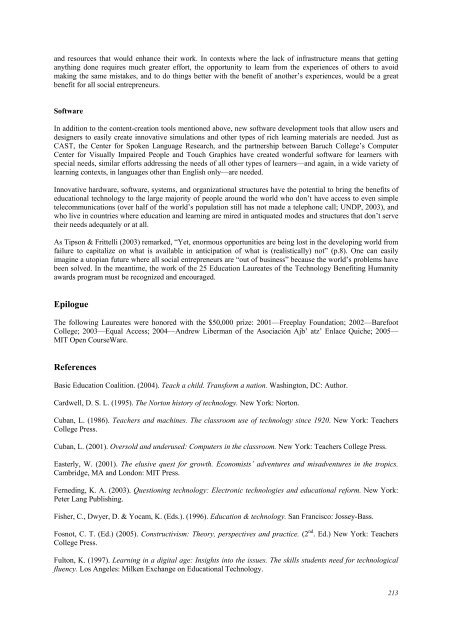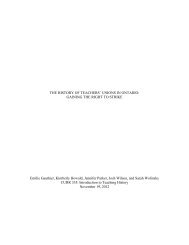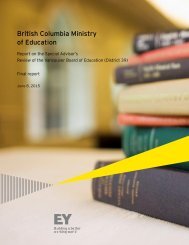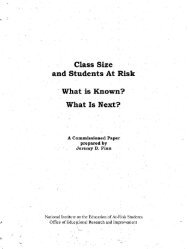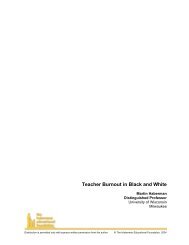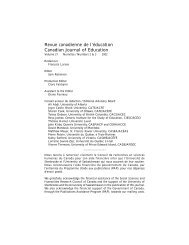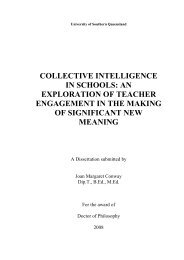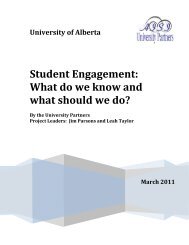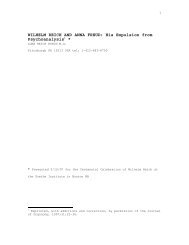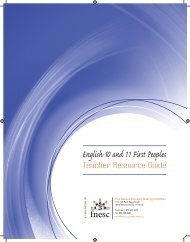October 2006 Volume 9 Number 4
October 2006 Volume 9 Number 4
October 2006 Volume 9 Number 4
Create successful ePaper yourself
Turn your PDF publications into a flip-book with our unique Google optimized e-Paper software.
and resources that would enhance their work. In contexts where the lack of infrastructure means that getting<br />
anything done requires much greater effort, the opportunity to learn from the experiences of others to avoid<br />
making the same mistakes, and to do things better with the benefit of another’s experiences, would be a great<br />
benefit for all social entrepreneurs.<br />
Software<br />
In addition to the content-creation tools mentioned above, new software development tools that allow users and<br />
designers to easily create innovative simulations and other types of rich learning materials are needed. Just as<br />
CAST, the Center for Spoken Language Research, and the partnership between Baruch College’s Computer<br />
Center for Visually Impaired People and Touch Graphics have created wonderful software for learners with<br />
special needs, similar efforts addressing the needs of all other types of learners—and again, in a wide variety of<br />
learning contexts, in languages other than English only—are needed.<br />
Innovative hardware, software, systems, and organizational structures have the potential to bring the benefits of<br />
educational technology to the large majority of people around the world who don’t have access to even simple<br />
telecommunications (over half of the world’s population still has not made a telephone call; UNDP, 2003), and<br />
who live in countries where education and learning are mired in antiquated modes and structures that don’t serve<br />
their needs adequately or at all.<br />
As Tipson & Frittelli (2003) remarked, “Yet, enormous opportunities are being lost in the developing world from<br />
failure to capitalize on what is available in anticipation of what is (realistically) not” (p.8). One can easily<br />
imagine a utopian future where all social entrepreneurs are “out of business” because the world’s problems have<br />
been solved. In the meantime, the work of the 25 Education Laureates of the Technology Benefiting Humanity<br />
awards program must be recognized and encouraged.<br />
Epilogue<br />
The following Laureates were honored with the $50,000 prize: 2001—Freeplay Foundation; 2002—Barefoot<br />
College; 2003—Equal Access; 2004—Andrew Liberman of the Asociación Ajb’ atz’ Enlace Quiche; 2005—<br />
MIT Open CourseWare.<br />
References<br />
Basic Education Coalition. (2004). Teach a child. Transform a nation. Washington, DC: Author.<br />
Cardwell, D. S. L. (1995). The Norton history of technology. New York: Norton.<br />
Cuban, L. (1986). Teachers and machines. The classroom use of technology since 1920. New York: Teachers<br />
College Press.<br />
Cuban, L. (2001). Oversold and underused: Computers in the classroom. New York: Teachers College Press.<br />
Easterly, W. (2001). The elusive quest for growth. Economists’ adventures and misadventures in the tropics.<br />
Cambridge, MA and London: MIT Press.<br />
Ferneding, K. A. (2003). Questioning technology: Electronic technologies and educational reform. New York:<br />
Peter Lang Publishing.<br />
Fisher, C., Dwyer, D. & Yocam, K. (Eds.). (1996). Education & technology. San Francisco: Jossey-Bass.<br />
Fosnot, C. T. (Ed.) (2005). Constructivism: Theory, perspectives and practice. (2 nd . Ed.) New York: Teachers<br />
College Press.<br />
Fulton, K. (1997). Learning in a digital age: Insights into the issues. The skills students need for technological<br />
fluency. Los Angeles: Milken Exchange on Educational Technology.<br />
213


